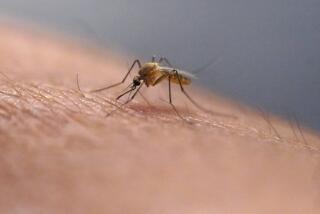Investigators Check to See if Hantavirus Killed Woman
HEMET, Calif. — Federal technicians were doing lab work Wednesday to determine if hantavirus killed a woman who had cleaned up a mountain cabin she planned to buy.
Results were expected this week, said Mark Lohman, spokesman for the Riverside County coroner. Donna Lynch, 44, of Hemet died at a hospital in her hometown Friday just hours after coming down with a cough and vomiting.
While awaiting a firm diagnosis, authorities went ahead with mice trapping in the Arrowbear area of the San Bernardino Mountains on Tuesday night, said Dr. Thomas Prendergast, San Bernardino County public health director.
Lynch would be the ninth person in California known to have died of the disease, carried by deer mice that live in foothills all over the Americas. She would be the first known hantavirus fatality in the popular resort region about 100 miles east of Los Angeles, Lohman said.
She and her fiance spent about two weeks working in the cabin, 30 miles north of Hemet. He also had flu-like symptoms, possibly a milder version of the sickness, authorities said.
The disease has turned up in all 58 California counties, said Scott Lewis of the state Health Services Department.
“Most of them have been in the foothill areas where you’re most likely to find deer mice in California, and the deer mouse is the most common carrier,” he said.
“Fortunately in the world of antibiotics, there are things we can do about it,” Lewis said.
Four of the California deaths predated identification of the latest version of hantavirus in 1993, when deaths in the Four Corners area of the Southwest touched off a search for the “mystery” illness.
Since then, it has sickened about 162 people in 27 states, and 76 of them have died, according to the federal Centers for Disease Control and Prevention in Atlanta.
Hantavirus pulmonary syndrome, no longer so mysterious, is caused by a strain of the virus found in rodent droppings. People usually get sick by breathing the dust.
Authorities warn people to rodent-proof homes or stay away from rat and mice nests. When cleaning up, first spray dusty spots with water, then use a breath filter and rubber gloves.
More to Read
Sign up for Essential California
The most important California stories and recommendations in your inbox every morning.
You may occasionally receive promotional content from the Los Angeles Times.









